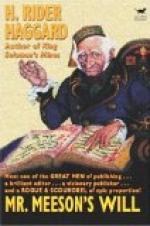Thus it seemed to Eustace, who knew “Jemima’s Vow” and also her previous abortive work almost by heart, that he was very intimately acquainted with Augusta, and as he was walking home that May evening, he was reflecting sadly enough of all that he had lost through that cruel shipwreck. He had lost Augusta, and, what was more, he had lost his uncle and his uncle’s vast fortune. For he, too, had seen the report of the application re Meeson in the Times, and, though he knew that he was disinherited, it was a little crushing. He had lost the fortune for Augusta’s sake, and now he had lost Augusta also; and he reflected, not without dismay, on the long dreary existence that stretched away before him, filled up as it were with prospective piles of Latin proofs. With a sigh he halted at the Wellington-street crossing in the Strand, which, owing to the constant stream of traffic at this point, is one of the worst in London. There was a block at the moment, as there generally is, and he stood for some minutes watching the frantic dashes of an old woman, who always tried to cross it at the wrong time, not without some amusement. Presently, however, a boy with a bundle of unfolded Globes under his arm came rushing along, making the place hideous with his howls.
“Wonderful escape of a lady and han infant!” he roared. “Account of the survivors of the Kangaroo—wonderful escape—desert island—arrival of the Magnolia with the criminals.”
Eustace jumped, and instantly bought a copy of the paper, stepping into the doorway of a shop where they sold masonic jewels of every size and hue, in order to read it. The very first thing that his eye fell on was an editorial paragraph.
“In another column,” ran the paragraph, “will be found a short account, telegraphed to us from Southampton just as we are going to press, of the most remarkable tale of the sea that we are acquainted with. The escape of Miss Augusta Smithers and of the little Lord Holmhurst—as we suppose that we must now call him—from the ill-fated Kangaroo, and their subsequent rescue, on Kerguelen Land, by the American whaler, will certainly take rank as the most romantic incident of its kind in the recent annals of shipwreck. Miss Smithers, who will be better known to the public as the authoress of that charming book ‘Jemima’s Vow,’ which took the town by storm about a year ago, will arrive at Waterloo Station by the 5.40 train, and we shall then—”




